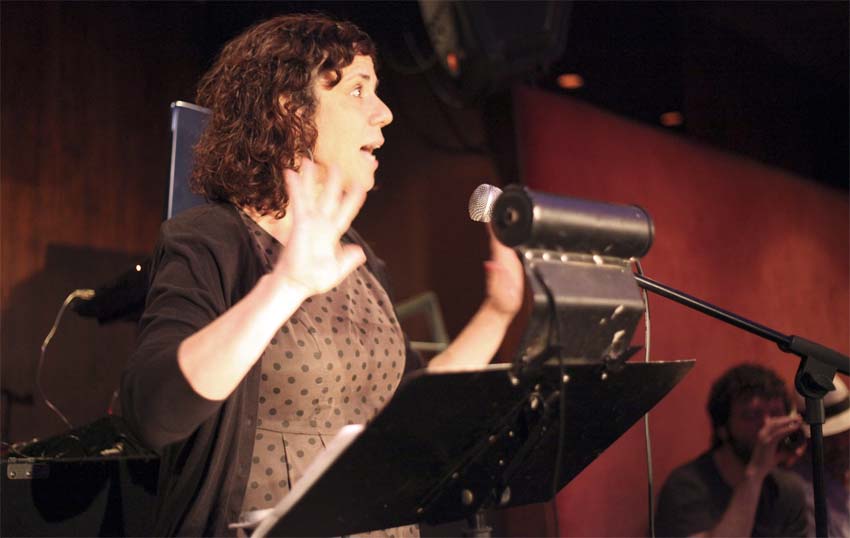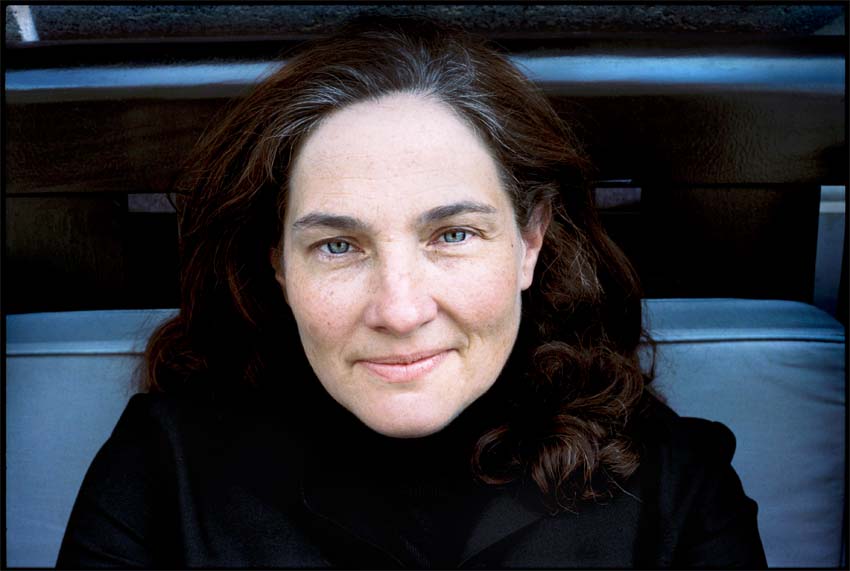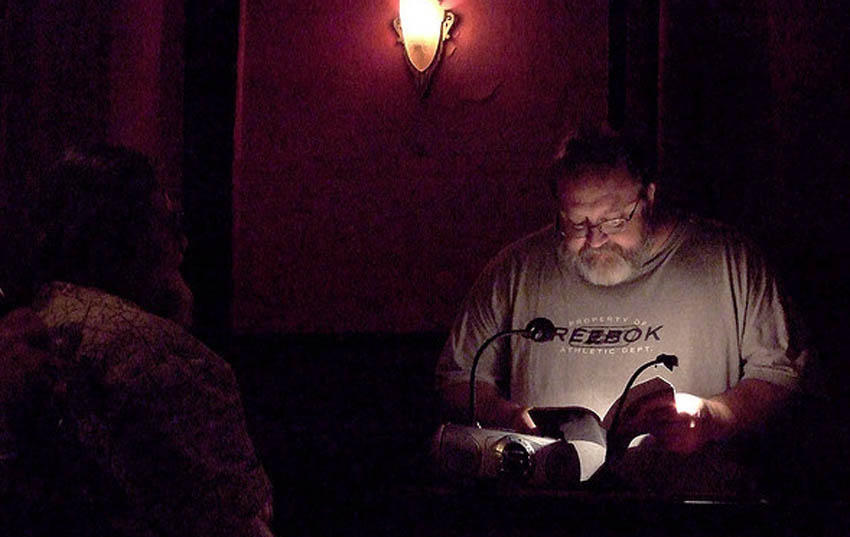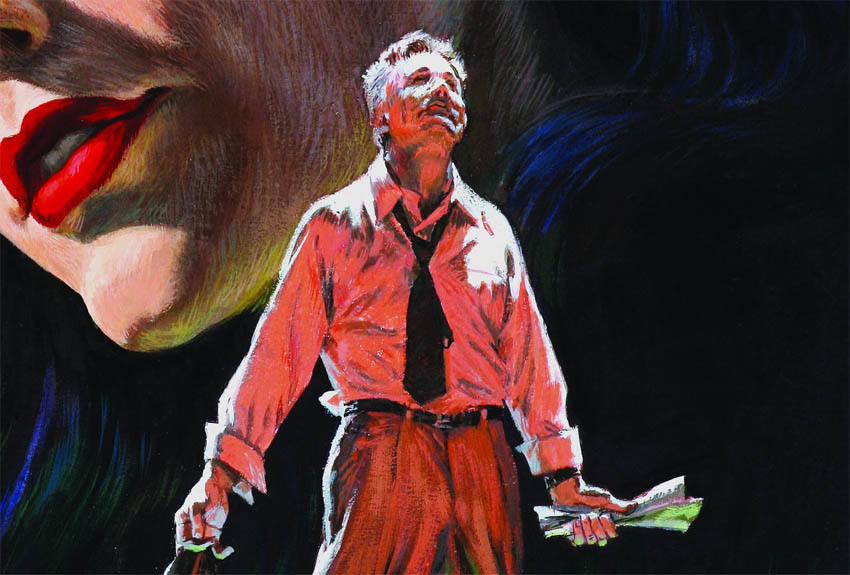Jami Attenberg is most recently the author of The Middlesteins. She previously appeared on The Bat Segundo Show #172.
Listen: Play in new window | Download
Condition of Mr. Segundo: Dodging the slings and arrows of families.
Author: Jami Attenberg
Subjects Discussed: Chapter headings with weight listings, why Edie wasn’t the first Middlestein to emerge from the Attenberg brain, finding the structure in The Middlesteins, The Corrections, how imagining alternative universe versions of the self is helpful in creating three-dimensional characters, Elizabeth Strout’s Olive Kitteridge, why it took so long for Attenberg to write about where she came from, the virtues of getting older, why it took nine years and four books for Attenberg to write about Judaism, the two books that Attenberg threw away, the aborted Antiheroine novel about a comic book artist, the inspirational qualities of breaking an ankle, pop-up books, the aborted Upstate novel, the problems with territorial novels, being message-oriented, attempts to get rid of bullshit, turning forty, writing a chapter in the first person plural, Joshua Ferris’s Then We Came to the End, Nick Hornby, unspoken statute of limitations concerning style, hearing fictional people gossip in the background, when agents find certain chapters to be too much of a risk, Benny’s mysterious and sudden hair loss, the long Richard chapter, how to sympathize with a bastard character, being protective of characters, leaving someone who is sick, balancing hope with hopelessness, emotional life vs. assessment, using the word “like” too much, Marilynne Robinson, when small domestic issues feel big in fiction, research into vascular surgery and Chinese cooking, exploring the unknown, asking mom for help with Yiddish, Attenberg’s new historical novel, writing a draft in four months, being a fast writer, spending too much time on a book, overthinking fiction, Joseph Mitchell’s Up in the Old Hotel, having no idea what’s going to happen, why Paul Ryan is an evil man, the horrors of National Bohemian Beer, what people drink in Baltimore, Joseph Mitchell’s Mazie as inspirational force, getting into the head of a real person, Instant Love vs. the fictional characters that inspire Attenberg now, how much “me” a novelist needs, Attenberg’s expanding worldview, and efforts to control life.
EXCERPT FROM SHOW:
Correspondent: I was curious not only about Edie’s fluctuating weight over the course of time and how time shows the perception of that, but also Benny’s hair loss. And not just because I’m bald. The fact of the matter is that you have this character. He balds all at once. Which suggests that there’s some Hapsburg-like problem within the Middlestein genotype. But I’m wondering. Was this a way to level the gender playing field in any way? Or was this a way of showing that anybody in this book could have her physicality or her place in the world just change on a dime?
Attenberg: Yes. That sounds really good.
Correspondent: (in melodramatic voice) How did it come about, Jami? (laughs)
Attenberg: I know. You always make it sound better and really important. You have a way of heightening things.
Correspondent: You’re saying you’re not important? I would disagree with that.
Attenberg: I think that Benny — I don’t know. It might be a really personal thing. Like all the men in my family, they all go bald really young.
Correspondent: All at once like that?
Attenberg: No! Not at all.
Correspondent: (laughs) I mean, it’s really one hell of a fate.
Attenberg: It’s like that psychic obvious emotional disturbance. He doesn’t really deal with things as he should in the time that he should. And he keeps things inside the family. And so that’s how it gets manifested. The hair loss. So it’s not really like a tough metaphor to get.
Correspondent: What about the long Richard chapter? This was one of my favorite parts of the book. Because he leaves Edie. And at that point, I’m thinking, “Well, this guy is a total bastard.” And then you have this long sad chapter of his efforts to date and who he gets involved with. And I then felt extremely sorry for him. And my feelings for the character changed over the course of this twenty or thirty page stretch. We were talking earlier about how a lot of the book was dictated by instinct. And I’m wondering. How much of the other side of Richard were you aware of in advance when you were working on this chapter? Or was this chapter a way for you to not view him as “Ah, this guy’s an asshole”?
Attenberg: It is a really good question that you ask. Because I actually had to write my way into feeling sympathetic for him. So you actually were with me on the journey. By the end of the book, I actually — I don’t know if I love him. But I like all of them. I was just trying to understand them all really deeply and understand all their imperfections. Again, when I say it, it just sounds so obvious and not complicated in the slightest. But people are flawed. And we need to understand why they’re flawed. And these people feel very real to me, even though I don’t know them. By the end of the book, I felt that I knew them. And I’m very protective of them actually. I’m a little terrified of any bad reviews. Like where they judge these characters. I’ll be like, “I’ll be the judge of them! Nobody else can!”
Correspondent: The books aren’t your children. The characters are your children.
Attenberg: The characters are my people. Yeah, I was trying to understand how somebody could do that. And how you could leave somebody who was sick. People do it all the time. And I know people who’ve done it. And I also know people who have gone back when they find out that people are sick. At some point, you have to be able to take care of yourself, I think.
Correspondent: But it seems to me — I’m wondering if you ever actually got a definitive answer to that question in exploring the other side of his character. Because people may leave someone who’s sick, but they may not even know why they do it.
Attenberg: I think he did the best that he could for himself. I don’t think he could be with her anymore. But it didn’t work out perfectly. But you just don’t get everything that you want. I don’t think there’s a lot of loose ends necessarily in the book. It’s not unfinished. There’s hope in it, but there’s also a little bit of hopelessness. You can’t have it all. You just can’t have all. Sorry, I’m getting strangely emotional about this. Because I haven’t talked about the book before. Not really, but I’m just…
Correspondent: I have yet to make anybody cry on this program.
Attenberg: Oh no! I’m not going to cry.
Correspondent: This is not a Mike Wallace kind of thing.
Attenberg: Because this is the first interview that I’ve done. So I haven’t really thought about this. Because so much of it is instinctual. So you don’t.
Correspondent: Where does thought apply when we’re talking about instinct? Obviously, assessing what you have done is an awkward thing for any author to do. But how does it play into the writing process? How do you assess what you have written? Or do you leave it and let it have its own emotional life?
Attenberg: No. I’m just starting to be able — by the way, I’m appalled at my use of the word “like” in this interview. I hear it like every five seconds and it’s making me crazy.
Correspondent: Do you need me to edit it out? (laughs)
Attenberg: What? Can you just do all the ums and all the likes?
Correspondent: We can just put a really strange sound where you say “like.” Auggh! Or something like that.
Attenberg: A little honking noise or something.
Correspondent: But seriously, back to this idea of, like, emotional life and analysis or assessment or intellectualizing something. I mean, does that play into any part of your writing process?
Attenberg: I’m so much more of a visceral writer than I am a cerebral writer. But I’m getting better at being a cerebral writer. Just the fact that I even thought about structure in the way that I did for this book makes me just think it actually is exciting to me. Because it’s just a step forward for me. I’m strategic. I’m getting to be more strategic. The more I read, the more I write. I treasure the fact that I’m a visceral writer. That it’s such a pure emotional — like, I’m on a quest for the emotional truth at all times. Again, everything I say sounds so pretentious. But I’m really trying so hard to be responsible to people’s emotions. Even if they’re fictional.
Correspondent: Maybe a way to answer this. Because we were talking before the tape was rolling about you reading Marilynne Robinson. And I’m wondering. What is it about her work right now that speaks to you as a writer? I mean, you mentioned that you were reading her for some future project. What do you draw from her? What do you take from her that is of value to you in evolving as a writer?
Attenberg: Well, she writes about faith. And since I’m writing a book about a character right now who’s finding faith, I was interested in that. But I think she’s someone who can just write about things that are very emotional and small and personal and domestic, I guess, but makes it feel really big. Like apocalyptic almost. I’m interested in the little moments, in making the little moments feel bigger. Am I answering this question? Sorry.
Correspondent: No, no, no, no. Don’t worry about it. Look, honestly, if you were to provide an insufficient answer, I would probably pester you. Or pester you politely. Or nudge you or what not. So in the acknowledgments, you mention your research into vascular surgery, Chinese cooking, and the magical powers of cumin and cinnamon. So I’m curious. What topics in this book required no research at all? And do you need to sometimes explore the unknown to push yourself further as a writer? Is this something that was part of the whole process of exploring faith? Getting older and so forth?
Attenberg: I mean, I had asked my mom for help on a lot of the Yiddish words. I will say that. Like I remember them from my youth. But I didn’t know when certain things were going to be appropriate. I was just talking about it. So the book that I’m working on now is a historical novel. And then The Middlesteins is more present tense, but also set in the world that I grew up in. And I visit there once a year and see a parents, who still live there. Who are still happily married and not morbidly obese. I should just clarify that. They’re not these characters. But it was whenever I stepped away from The Middlesteins — and I wrote it really fast. I wrote it in four months. The first draft was four months. Whenever I stepped away from it, I could come back to it fairly easily. Because I always knew where it was located. So little things that I had to research ended up informing it and being really delightful and helpful. But I didn’t have to do a lot of research on it. Because it felt really familiar. The book that I’m working on now is a million times harder. Because it’s set in an unfamiliar location. It’s set in an unfamiliar time. Everything about it is new. Everything has to be invented. And it’s just really hard for me to put myself in the room. That said, once I get there, it’s a really wonderful place to be.
Correspondent: Everything has to be invented? I mean, there’s a lot of documentation for a particular time.
Attenberg: Yeah. But it doesn’t feel like anything familiar to me for some reason. Yeah, I mean, I could look at pictures of things.
Correspondent: So you need a certain amount of familiarity with any kind of novel.
Attenberg: For it to go like super fast. Yes. I don’t need it. But it was certainly much more helpful. Like I admit. I think this book is going to take me a year to write for a first draft. Like it’s hard for me to imagine just flying through it. But I love it. I love it. I’m like very struck by the character. The narrator. And it’s fun to write first person. I haven’t done it in a while. But The Middlesteins was, I don’t want to say it was an easy book. That’s not true. Because I really thought very deeply about things. But it came out of me very easily.
Correspondent: How important, do you think, is it to maintain a certain amount of speed? Do you have any frustrations of any part of the process going slower than the norm? Or anything like that?
Attenberg: No.
Correspondent: Do you accept the pace that it is?
Attenberg: Yeah. I have always been a really fast writer. I think it’s because I have a background maybe in advertising. Or I’m a fast thinker. Or whatever. But I’m learning that it’s good to slow it down. I’m learning that your senses — like, I think you can spend too much time on a book. I actually do believe that. Because I know people who overwrite. And I’m like, “You know what? Sometimes somebody just walks across the room.” It’s totally fine for them to just walk across the room and not experience eight emotions while they do it. And you don’t need to know how their foot fell on the floor. Sometimes you just have to get that character across the room. So I think that you can overthink things. But I’m pretty into just getting to the heart of the matter. Getting to the story.
Correspondent: When was the last time you overthought any piece of fiction that you were working on?
Attenberg: I’m overthinking it right now a little bit. I have to admit. I usually write 1,000 words a day. And I’m doing 500 words a day. And it’s like pulling teeth. Even though I love it. I love writing. And I love this book. It’s because it’s inspired by a real person, I think. That’s part of it. And I want to be respectful of her. Even though I never met her. She died before I was born. Twenty years before I was born. And I don’t know very much about her.
Correspondent: Do you fear knowing too much about her?
Attenberg: Oh yeah. I mean, it’s inspired by one of the characters in Up in the Old Hotel. Did you ever read that?
Correspondent: No, I haven’t.
Attenberg: It’s by Joseph Mitchell. Oh, you have to read it! You have to!
Correspondent: I have not read Joseph Mitchell. I know. I know.
Attenberg: Oh my god! YOU have to.
Correspondent: I know. There are gaps, I’m afraid.
Attenberg: And also because it’s reported. And you’re somebody who reports. Oh yeah. It’s totally for you.
Correspondent: I know. I know.
Attenberg: Maybe you’re afraid to read it. Are you afraid?
Correspondent: No! I just…I’ve never gotten around to it! I read a lot!
Attenberg: It’s so good.
Correspondent: I read like 200 books a year or something. So…
Attenberg: I think it’s important for you to read it.
Correspondent: I know. Other people have told me this.
Attenberg: The next interview.
Correspondent: I will read it next year. How about that?
Attenberg: Promise? Alright. I want to hear how much you love it. So anyway, that was one of the characters in the book. She — see, I’m almost more excited talking about the book that I’m working on now…
Correspondent: Sure! We can do that.
Attenberg: …than The Middlesteins. Not because I’m not excited about it, but it’s in such a no man’s land. Because I don’t know when you’re going to put this on the Internet. But I have two and a half months left to go until the book comes out. As of right now.
Correspondent: It’s going to go up in two and a half months.
Attenberg: So it’s going to go up in two and a half. So right now, I have no idea what’s going to happen. It’s August in New York. The publishing industry is dead. Everyone’s like on vacation somewhere.
Correspondent: We don’t even know what’s going to happen politically.
Attenberg: Politically.
Correspondent: Ryan has just been announced as VP. So for those who would like to travel in time with us. (laughs)
Attenberg: I know! It’s freaking me out.
Correspondent: Because what else is going to happen? This has been a crazy cataclysmic year, news wise.
Attenberg: I don’t even have anything to say about Ryan. Because I’m really stunned by the whole thing. Like he’s like a horrible evil man! He’s a terrible person.
Correspondent: I should point out that, when you said “horrible evil man,” you had this huge, huge smile on your face and this great delight and glee in your eyes. Just to be clear on this. (laughs)
Attenberg: (laughs) He’s just like the worst human being ever. And it’s interesting to read all the coverage today.
Correspondent: Oh man! What if something happens to Ryan in the next two and a half months? And this goes on. And we’ve been talking about him. And we’ve called him a horrible evil man. And it’s actually proved. And he’s disgraced or something. And then Romney has to choose another VP candidate.
Attenberg: There’s not going to be any disgrace. This man is a robot.
Correspondent: (laughs)
Attenberg: He’s such an evil robot! He’s been living a perfect unassailable life since he was like born basically. He’s like Satan’s spawn! I mean, I think he’s really been sent here to destroy all of us. I think. God, and the glee from all the commentators. They’re losing their minds over this. Because he’s so evil. Gosh, anyway…
Correspondent: Okay. I have a very important question. Probably the most important question I will ask you. And that involves National Bohemian Beer. It’s a rather notorious Baltimore specialty.
Attenberg: Yes.
Correspondent: Fifteen years, you could not even get this in draft. And they only recently put in kegs. In 2011. So I’m curious if Kenneth’s adventures late in the book was a way to atone for any notorious carousing experiences in the Baltimore area that you might have had. To exact retribution, perhaps, on the Pabst Brewing Company.
Attenberg: (laughs) No! I was just thinking about Baltimore. Because that’s where I went to college. But I’m really surprised that you know so much about this. How do you know so much about this? Or you from there?
Correspondent: I’ve been to Baltimore a few times, but, no, I just know this.
Attenberg: You just researched this.
Correspondent: National Bohemian is a terrible beer. And it’s only a Baltimore beer.
Attenberg: Natty Boh. That’s what we used to call it in college. Because he lived in Baltimore. That was the beer that you drink in vast quantities. Whether you wanted to or not.
(Photo: Jesse Chan-Norris)
The Bat Segundo Show #494: Jami Attenberg (Download MP3)




